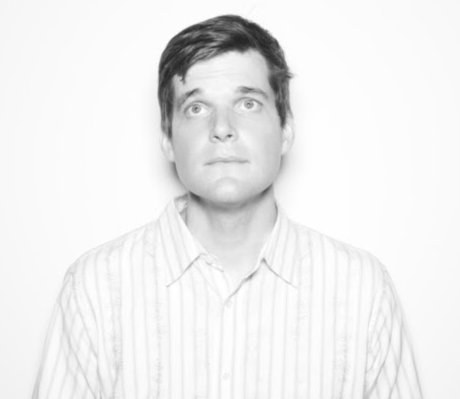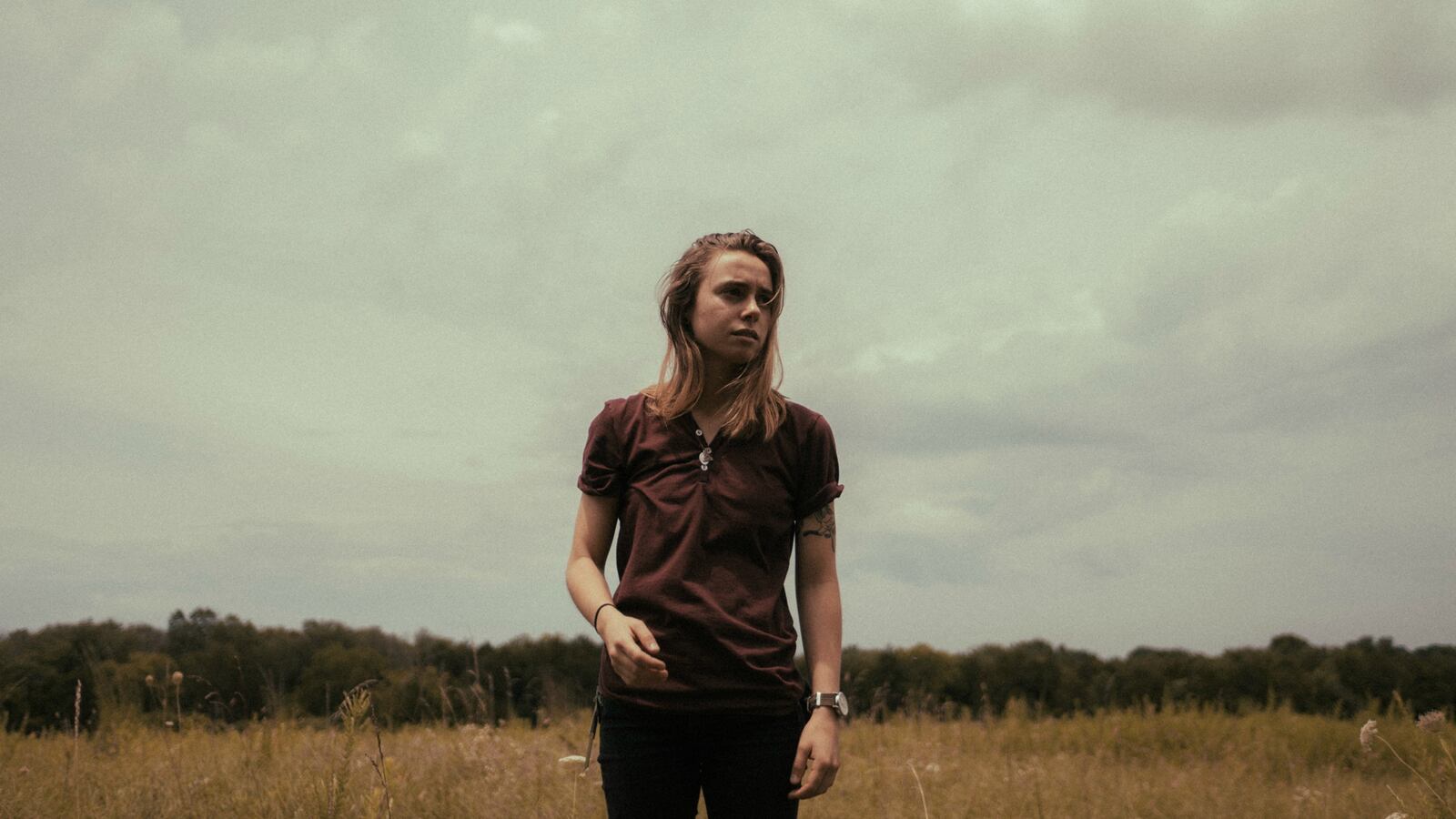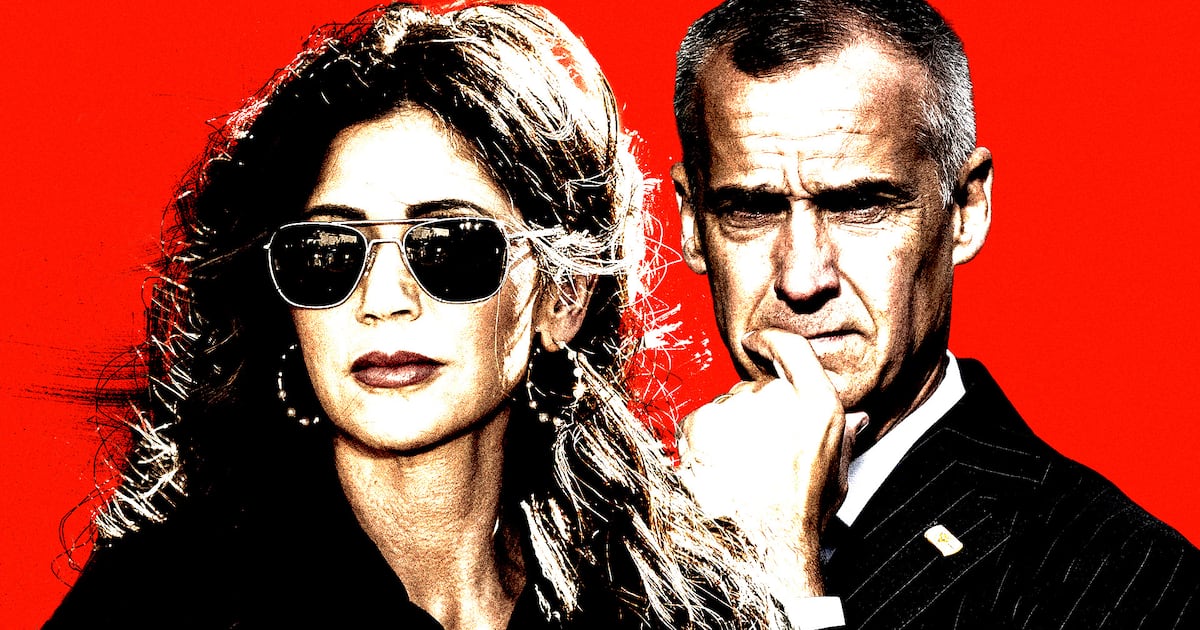Julien Baker tends to spend a lot of time worrying what other people will think.
By her own admittance, she tends to let her worries over other people’s reactions build up in her head, only to discover that she never had anything to fear. It’s a habit she’s working hard to break. But calling from her tour van, the 22-year-old singer-songwriter can’t help but apologize.
“Oh man, sorry,” she says, momentarily taking a break from answering a question. “If it sounds scratchy, I’m pulling a sweater over my head because we’re in Oregon and it’s cold.”
Once she’s sufficiently warmed up, Baker continues to discuss the path that led to the creation of Turn Out the Lights, one of the most acclaimed albums of last year. It’s a collection of glistening orchestral folk songs delicate and incisive enough to make you cry, but capable of swelling to jaw-dropping moments of catharsis. The album topped most end-of-the-year lists and recently earned her a debut television performance on The Late Show with Stephen Colbert.
Baker was born in Memphis, Tennessee, and spent her formative years playing in an all-over-the-place high school alt-rock group called Forrister, which changed monikers after they discovered their original name, The Star Killers, was being used by an electronic music artist.
“I recently just went back and listened to the CD we put out, and we had no idea what we wanted to sound like,” she recalls, noting that she and the drummer listened to emo and metalcore groups like Manchester Orchestra and Circa Survive, while the guitarist was more into alt-country and indie groups like Wilco and Guster. Though she denies there are any songs where she’s screaming over metal riffs, she explains, “We would have songs that sounded very experimental rock, but then there would also be songs that were just essentially a Lucero song; it was like a country song.”
After graduation, she enrolled in Middle Tennessee State University to study English and Audio Engineering. In her spare time, she recorded her solo debut Sprained Ankle, a collection of bare-bones folk songs that showcases her emphatic lyricism and ability to draw listeners in with only a few chords. The 2015 album was an immediate underground hit, but Baker fretted and worried herself into a lather as she tried to work up the courage to tell her parents and professors that she wanted to take a hiatus from school to tour. Turns out they were all way ahead of her.
Her dad, a grunge-rock fan in his teen years, used to accompany her band on DIY tours of “basements and storage units and crappy bars,” she says. “And when I told them that I was going to take some time off of school because things were going well enough that I could support myself musically, I had worked out this whole pitch in justification of it.”
She remembers that “When I got on the phone, my mom just said, ‘I would never dream of telling you not to go and pursue this amazing opportunity.’ And I thought, ‘What did I stress out about?’” Similarly, she says, “I had professors that straight up encouraged me to leave. They were just like, ‘You should go do this for as long as you can and then come back because school is not going anywhere.’”
Baker has lots of experience with building things up in her head. A devout Christian, she struggled with how to tell her parents and church community about her queer identity. “That’s another thing where perception is different than actuality, because a lot of the fear that I felt was not really related to what I knew to be the character of the people around me,” she says. “When I came out to my peers and even to my parents, they were more accepting than I could have ever imagined them to be. The person who was in charge of music at my church who I came out to just said, ‘So?’ And I remember thinking, ‘Is that really your response?’”
Even now, years later, she still sounds relieved when recounting the experience. “I had this presupposed fear that created a lot of shame that I didn’t start to un-work until I saw that people were more accepting than I thought they were going to be.” She’s quick to add that “not every family is going to respond that way. I don’t want to diminish the very real hurt that some people have felt at the hands of the church.”
Sprained Ankle chronicled her experience with shame, depression, and substance abuse (she’s been sober now for several years) in poetic but unflinching detail. On one album highlight, “Everybody Does,” she sounds resigned, sighing, “I know myself better than anybody else / And you’re gonna run / You’re gonna run / when you find out who I am.” Playing those songs every night and meeting the people who connected with them helped her put that time behind her.
“Now that I can see other people taking the songs on to mean whatever they want, then I can say, ‘Well, this song doesn’t have to remain just an artifact of a sad thing that happened. It can take on a new purpose and a new form and be used for this beautiful and encouraging thing,’” she says. “I just try to remove myself from the equation and view the song as something that can be a resource for someone else. And it helps insulate me from something—feeling like it’s too much.”
(She knows what it's like to use other people’s expressions of pain as a resource. She recently began working a solo rendition of the Audioslave song “Doesn’t Remind Me” into her sets in tribute to the late Chris Cornell, who took his life last year. “The last line makes me cry every time, and I couldn’t get through playing. The hair on my arms is standing up because that song is so good.”)
Baker was aware that people responded to the playing-in-the-room-with-you intimacy of her debut, and worried how her fans would react to the grander, more ornate approach of Turn Out the Lights.
“I had this bizarre, oxymoronic fear that people would not like it because it sounded too different. And then also that people would not like it because it sounded too much the same,” she says. “I remember talking about it and thinking that I would rather take a risk of putting out something that I was very proud of and that I actually liked, than allow my fear of people’s perception of the record to influence its creation.”
Baker produced the album herself, with mixing assist from Craig Silvey (The National, Arcade Fire, Florence & the Machine). She recorded most of the instruments on her own. Though she had some assistance from her friend Cameron Boucher of the politically minded emo group Sorority Noise, who recalls that during the first time he saw her play, “I’m pretty sure I teared up during the first song, because I was so taken aback by her presence, voice, and candor. We became friends—I’d consider her one of my best buds—and began sharing what we were writing with each other. She asked me to come down to Memphis to help with the record and I learned clarinet on the drive down from Pittsburgh.”
Though there were songs on Turn Out the Lights, such as “Hurt Less” and “Claws in Your Back” that were so personal she felt nervous about releasing them, she took inspiration from a graphic novel her friend lent her, Brian K. Vaughan’s Saga. “The quote is, ‘That’s foolish to kill your darlings. You should kill everything but your darlings if you really love something. You should fight for that thing.’ I don’t know. I kinda felt that way about leaving the songs on there. That made me nervous.” (She says she plans to read the graphic novel Blankets next, as soon as she finds the time.)
Her success has made her one of the most acclaimed young songwriters of her generation, one as equally comfortable joining Brooklyn songwriter Sharon Van Etten onstage as dueting with the hardcore group Touché Amoré. But despite her success, she has no intention of leaving her native Memphis, and instead plans to stay home and make it a better place.
“I think it’s important to invest in the community that you are within and that needs help,” she says. “I could go to a place where there they already have a lot of progressive legislature and I could feel comfortable there, or I could understand that if I want those same rights and those same comforts to be afforded to other human beings, then I have to stay in a place where that's maybe not a reality yet in order to work towards that goal.”
And with that, she says thanks for the interview and apologizes for having to run, and promises that she’ll make everyone in the van listen to Audioslave for the rest of the day.






